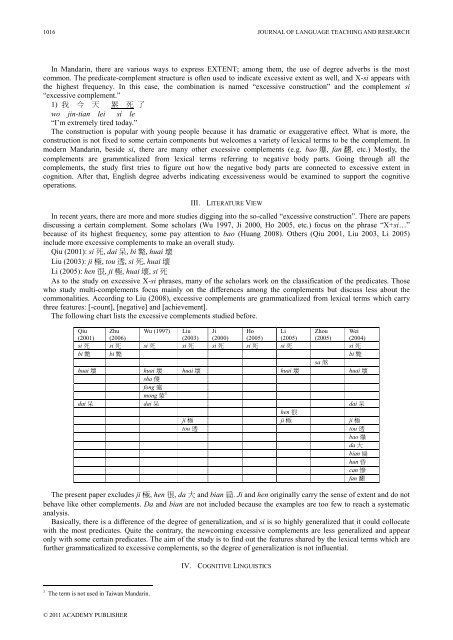Journal of Language Teaching and Research Contents - Academy ...
Journal of Language Teaching and Research Contents - Academy ...
Journal of Language Teaching and Research Contents - Academy ...
You also want an ePaper? Increase the reach of your titles
YUMPU automatically turns print PDFs into web optimized ePapers that Google loves.
1016<br />
© 2011 ACADEMY PUBLISHER<br />
JOURNAL OF LANGUAGE TEACHING AND RESEARCH<br />
In M<strong>and</strong>arin, there are various ways to express EXTENT; among them, the use <strong>of</strong> degree adverbs is the most<br />
common. The predicate-complement structure is <strong>of</strong>ten used to indicate excessive extent as well, <strong>and</strong> X-si appears with<br />
the highest frequency. In this case, the combination is named ―excessive construction‖ <strong>and</strong> the complement si<br />
―excessive complement.‖<br />
1) 我 今 天 累 死 了<br />
wo jin-tian lei si le<br />
―I’m extremely tired today.‖<br />
The construction is popular with young people because it has dramatic or exaggerative effect. What is more, the<br />
construction is not fixed to some certain components but welcomes a variety <strong>of</strong> lexical terms to be the complement. In<br />
modern M<strong>and</strong>arin, beside si, there are many other excessive complements (e.g. bao 爆, fan 翻, etc.) Mostly, the<br />
complements are grammticalized from lexical terms referring to negative body parts. Going through all the<br />
complements, the study first tries to figure out how the negative body parts are connected to excessive extent in<br />
cognition. After that, English degree adverbs indicating excessiveness would be examined to support the cognitive<br />
operations.<br />
III. LITERATURE VIEW<br />
In recent years, there are more <strong>and</strong> more studies digging into the so-called ―excessive construction‖. There are papers<br />
discussing a certain complement. Some scholars (Wu 1997, Ji 2000, Ho 2005, etc.) focus on the phrase ―X+si…‖<br />
because <strong>of</strong> its highest frequency, some pay attention to bao (Huang 2008). Others (Qiu 2001, Liu 2003, Li 2005)<br />
include more excessive complements to make an overall study.<br />
Qiu (2001): si 死, dai 呆, bi 斃, huai 壞<br />
Liu (2003): ji 極, tou 透, si 死, huai 壞<br />
Li (2005): hen 很, ji 極, huai 壞, si 死<br />
As to the study on excessive X-si phrases, many <strong>of</strong> the scholars work on the classification <strong>of</strong> the predicates. Those<br />
who study multi-complements focus mainly on the differences among the complements but discuss less about the<br />
commonalities. According to Liu (2008), excessive complements are grammaticalized from lexical terms which carry<br />
three features: [-count], [negative] <strong>and</strong> [achievement].<br />
The following chart lists the excessive complements studied before.<br />
Qiu Zhu Wu (1997) Liu Ji Ho Li Zhou Wei<br />
(2001) (2006)<br />
(2003) (2000) (2005) (2005) (2005) (2004)<br />
si 死 si 死 si 死 si 死 si 死 si 死 si 死 si 死<br />
bi 斃 bi 斃<br />
sa 煞<br />
bi 斃<br />
huai 壞 huai 壞<br />
sha 傻<br />
fong 瘋<br />
mong 蒙<br />
huai 壞 huai 壞 huai 壞<br />
3<br />
dai 呆 dai 呆<br />
hen 很<br />
dai 呆<br />
ji 極 ji 極 ji 極<br />
tou 透 tou 透<br />
bao 爆<br />
da 大<br />
bian 扁<br />
hun 昏<br />
can 慘<br />
fan 翻<br />
The present paper excludes ji 極, hen 很, da 大 <strong>and</strong> bian 扁. Ji <strong>and</strong> hen originally carry the sense <strong>of</strong> extent <strong>and</strong> do not<br />
behave like other complements. Da <strong>and</strong> bian are not included because the examples are too few to reach a systematic<br />
analysis.<br />
Basically, there is a difference <strong>of</strong> the degree <strong>of</strong> generalization, <strong>and</strong> si is so highly generalized that it could collocate<br />
with the most predicates. Quite the contrary, the newcoming excessive complements are less generalized <strong>and</strong> appear<br />
only with some certain predicates. The aim <strong>of</strong> the study is to find out the features shared by the lexical terms which are<br />
further grammaticalized to excessive complements, so the degree <strong>of</strong> generalization is not influential.<br />
3 The term is not used in Taiwan M<strong>and</strong>arin.<br />
IV. COGNITIVE LINGUISTICS

















